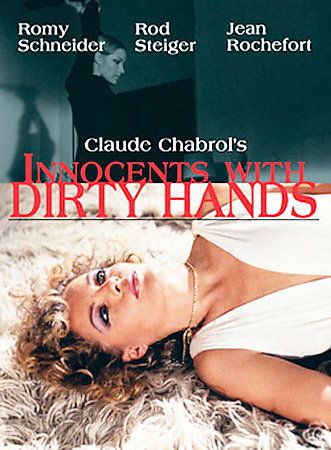
INNOCENTS WITH DIRTY HANDS
France, 1975, 121 minutes, Colour.
Romy Schneider, Rod Steiger, Francois Perrot, Hans Christian Blech, Pierre Santini, Jean Rochefort.
Directed by Claude Chabrol.
For fifty years Claude Chabrol has directed many, many murder mysteries, dramas, films raising issues of relationships, fidelity and infidelity leading to violence. During the 1960s and 1970s he made a number of these films – That the Beast Might Die, The Unfaithful Wife, The Butcher, The Break- Up and Just before Nightfall. This film is very much in that vein.
This is also the material of such financial fraud manipulations and murder films like Double Indemnity. Romy Schneider is married to the repulsive Rod Steiger and plans to murder him with her lover. However, the lover has nerves, there is a mystery as to what happens to the husband, the wife is left to face the police and justice alone. With the manipulation of the husband, it almost seems as if the murderers are innocents, though they have direty hands.
This is one of the many typical Chabrol films and, even though he made a number of other genres, political films like Nada and The Story of Women, his heritage is very much this kind of portrait of French society, within a clearly-defined French context, with sexuality, fidelity, infidelity and murder.
1. The reputation of Claude Chabrol and his interest in mysteries, murder? Explorations of guilt, justice, repentance, expiation, the administration of justice? His interest in the transferring of guilt, sharing of guilt and justice? This thriller and murder story within the framework of Chabrol's tradition? The impact of this film, its quality?
2. Ironies of the title and reference to the main characters? The original novel was called 'The Damned Innocents'.
3. Chabrol's use of colour, French locations, the atmosphere of France, the coast? The musical background? The importance of his camera techniques for example angle shots, motion shots, the initial entrance by helicopter etc.? The particular style of this kind of psychological thriller?
4. Critics comment on his ability with "purple passages". Was this a feature of this particular film? Which passages? Others comment that the colour of Chabrol is thrillers is black. Black comedy, satire, melodrama?
5. The importance of the structure for audience interest and involvement, for the ironies and for the exploration of themes of guilt? Louis as the initial victim, Louis becoming the victor? Initial sympathies with Louis, sympathies with Geoff and Julie and a feeling for their murderous intent? The shifting of sympathies? Shifting in sympathies and understanding? Where van the major guilt? The intricacies of guilt and innocence? The film's attention to detail of dialogue, psychology within the framework?
6. The initial atmosphere, the coast, the house, the audience flying in? The initial impression of Julie and her sensuality, contrasting with Louis and his drinking and his bitterness? Geoff as an attractive alternative to Louis? The audience watching the triangle and the psychological tensions? The detail of fighting, loving?
7. The irony of Julie and Geoff as innocents who wore guilty, making all their plans? The intensity of their love, sensuality? The irony of Louis actually overhearing it? The impression that Louis got on overhearing it, the impression that the audience got? Why had Julie married Louis, the quality of their marriage, failure, Julie's beauty and ability, Louis and his impotence? Geoff and his background, delineation of his character - an alternative hero, villain?
8. The importance of the detail, of the plan, as initially known, as explained by Louis when they went wrong? The intricacies of what is revealed for a thriller, a mystery?
9. The irony of Louis's character and his bitterness? Sympathy for him as a victim, sympathy when he reappeared? The innate cruelty in his character, resentment? His retracing what had happened and his tricking of Geoff and Julie at every point? His impotence and his love? Violence? The style of his dress ? an enigmatic 'ancient mariner'? The reawakening of his love because of the violent involvement. Julie's reawakening?
10. Julie's reaction to Louis's behaviour? Her anxiety, waiting for letters, fright at his appearance? Her reception of his confession? Any life possible with him? The irony of thinking that Geoff was dead?
11. How melodramatic was the reappearance of Geoff? The revelation of Louis's inability to kill him? A modification of Louis's guilt? Guilt in the mind, guilt in fact? George Thorrent and Geoff's brutalising and robbing? Geoff in a guilty light, as brutal as Louis and as greedy?
12. The encounters between Geoff and Julie after his reappearance with the overtones of sexuality, violence, in the context of Louis's heart attack? The comparison with their innocence before and after the events? What had happened to each of them? Who was guilty at the end?
13. The counterpointing for the thriller techniques of the presence of the police, their theories, their theories being close to the truth? The ironic presence with eating meals, chess, discussions?
14. The ironies of the ending? For Geoff and death? For Louis and seeming death? For Julie?
15. How effective is this kind of thriller for an exploration of innocence and guilt?
16. How well did the film explore and use themes of love, fidelity, betrayal, violence and innocence?
17. Themes of justice, where it was done, changes of attitude, ironies? Pain and expiation?
18. Themes of death as real, as in the imagination and intentions? Murder in fact, murder in the mind?